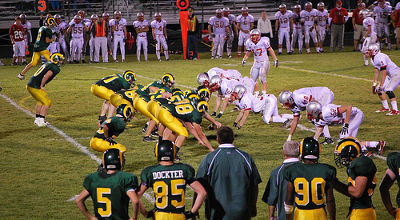ACLU Attacks Student-Led Prayer at Football Games
Alliance Defending Freedom (ADF) sent a Michigan school district a legal letter Friday after the American Civil Liberties Union (ACLU) formally complained about prayers at the conclusion of football games that school officials found to be voluntary and student-led.
“There’s no legitimate basis for public school officials to shut down students’ private religious speech,” says litigation counsel Rory Gray. “Students who express their faith before, during or after the school day are exercising their constitutional freedoms. Atheist groups are attempting to browbeat schools into believing otherwise.”
After the ACLU sent Bloomfield Hills Schools a letter incorrectly suggesting that a Lahser High School football coach was leading students in prayer after the conclusion of games, the district cited a speech policy banning “prayer or references of any religious nature … at school-sponsored events such as banquets, commencement, assemblies and programs” and attempted to prohibit the football team’s longstanding practice of voluntary, student-led prayer.
The school district has since verbally agreed to allow students to voluntarily pray after football games but has taken no steps to revise its policies to comply with the First Amendment.
The ADF letter explains that the Supreme Court affirms students are “free to ‘express [their opinions] even on controversial subjects,’ not only in ‘the classroom,’ but also ‘in the cafeteria, or on the playing field, or [elsewhere] on the campus during authorized hours.’”
The letter also explains that “nothing in the Constitution … prohibits any public school student from voluntarily praying at any time before, during, or after the schoolday.”
“The Constitution should be the only permission slip students need to exercise their freedom of speech,” adds senior legal counsel Jeremy Tedesco. “We commend the school for not caving to the ACLU’s unwarranted demands but urge them to amend their outdated policies so that this does not happen in the future and students’ religious speech is protected.”














































